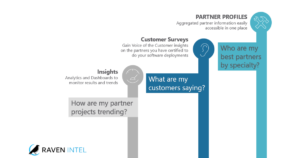Top 10 Things Every Consulting Partner Ecosystem Should Have

Most Enterprise Software vendors rely on a Channel Partners network to extend the value and reach of their products. Microsoft has said that for every $1 of software they sell, their consulting partners make $9. It’s the same with SAP, Salesforce, Workday, Oracle and others. The opportunity for consulting partners in this time of explosive cloud growth is huge, but a managing and growing a partner ecosystem is both an art and science. Based upon the 1000+ customer reviews we’ve see at Raven Intel, partner satisfaction is intrinsically linked to software vendor satisfaction, and has a direct correlation on a customer’s likelihood to buy more software in the future. Analyzing Raven’s aggregate customer review data by software has provided a unique ‘bird’s eye’ perspective on the various partner ecosystems, and there are themes that we’ve seen emerge.
Here are our (10) rules for software vendors to ensure their partner ecosystem is foundational to success.
10. A wide range of consulting partners which gives customers choice—from the Big 5 to mid-sized firms to boutiques. The portfolio of partners should mirror the customer base demographics in terms of geography, industries & scale. In addition, software vendors should make it easy for customers to know who all their partners are, where they play best as well as show a partners track record of success.
9. Quality of consulting partners who can represent & extend the brand of the software company. Partners are an integral distribution channel and can make or break the reputation of the software.
8. Deep & wide consulting expertise – on the software platform as well as those who can provide functional experience within an industry and business function.
7. Innovation & the ability to build relevant extensions on the software that integrate well and provide improved use. This adds a ‘stickiness factor’ to the likelihood the customer will remain a client.
6. Effective onboarding and training programs that ensure partners have the domain expertise to work with given software and ongoing programs and communication to ensure consulting partners are on the front end of system changes, upgrades, vendor leadership changes, etc. Legitimate certifications and continuing education for partner consultants that require they meet minimum thresholds of education, experience & knowledge.
5. Controls. Regularly measuring quality of consulting partner work based upon customer feedback from an independent perspective. This allows vendors to recognize top partners & gives them data so there’s no question who they need to level-up (or kick out.)
4. A level playing field. Not cherry-picking consulting partners for customers based upon name brand or because they fund the top sponsorships–but allowing the solid independent players without million dollar budgets the same opportunities to compete for business.
3. Access to information that makes it easy for consulting partners to sell & service customers in the same way that a vendor’s own employees do.
2. Creation of standard customer references & case studies that promote the quality and scope of work done together.
1. Active listening to partner feedback on what’s working / what’s not & ensuring the feedback reaches those internally that can impact change. It’s as valuable as customer feedback (and more so in some cases.)
What else do you think is important for software vendors to keep in mind? Please write in the comments below.

